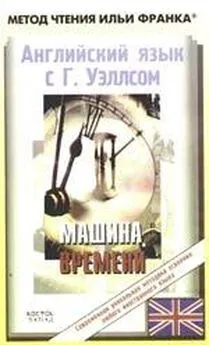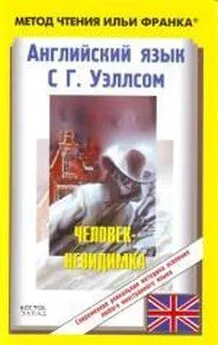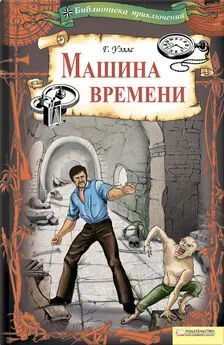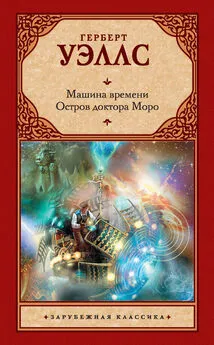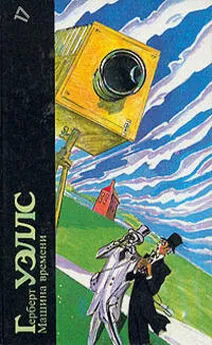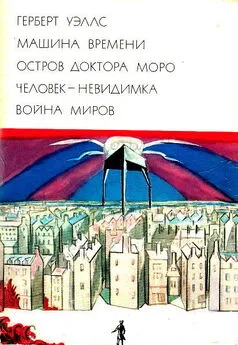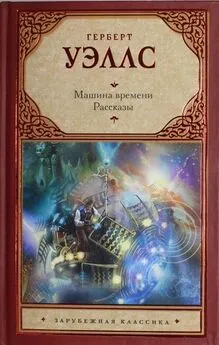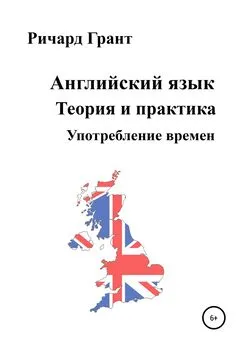H. Wells - Английский язык с Гербертом Уэллсом. Машина Времени
- Название:Английский язык с Гербертом Уэллсом. Машина Времени
- Автор:
- Жанр:
- Издательство:неизвестно
- Год:неизвестен
- ISBN:нет данных
- Рейтинг:
- Избранное:Добавить в избранное
-
Отзывы:
-
Ваша оценка:
H. Wells - Английский язык с Гербертом Уэллсом. Машина Времени краткое содержание
Английский язык с Гербертом Уэллсом. Машина Времени - читать онлайн бесплатно полную версию (весь текст целиком)
Интервал:
Закладка:
equipped [I`kwIpt], purposeless [`pWpqslIs], languor [`lxNgq]
For such a life, what we should call the weak are as well equipped as the strong, are indeed no longer weak. Better equipped indeed they are, for the strong would be fretted by an energy for which there was no outlet. No doubt the exquisite beauty of the buildings I saw was the outcome of the last surgings of the now purposeless energy of mankind before it settled down into perfect harmony with the conditions under which it lived—the flourish of that triumph which began the last great peace. This has ever been the fate of energy in security; it takes to art and to eroticism, and then come languor and decay.
'Even this artistic impetus would at last die away (даже этот художественный импульс в конце концов должен был затихнуть; impetus — стремительность, силадвижения; побуждение, движущаясила, импульс; to die away — увядать; замирать, затихать/озвукеит. п./ )—had almost died in the Time I saw (и почти затих в том Времени, которое я увидел). To adorn themselves with flowers, to dance, to sing in the sunlight (украшать себя цветами, танцевать и петь под солнцем): so much was left of the artistic spirit, and no more (только это осталось от художественного духовного начала, не более того; spirit — дух, духовное начало ). Even that would fade in the end into a contented inactivity (но даже и это должно было в конце концов раствориться в /само/довольном бездействии; tofade— вянуть, увядать; постепенно исчезать, растворяться; tocontent— удовлетворять, довольствоваться чем-либо; contented— довольный, удовлетворенный ). We are kept keen on the grindstone of pain and necessity (мы сохраняем остроту /чувств/ только на точильном камне боли и нужды; keen— острый; резкий ), and, it seemed to me (а мне показалось), that here was that hateful grindstone broken at last (что здесь этот ненавистный точильный камень был наконец разрушен; tobreak— ломать, разбивать, разрушать )!
impetus [`ImpItqs], adorn [q`dLn], grindstone [`graIndstqun]
'Even this artistic impetus would at last die away—had almost died in the Time I saw. To adorn themselves with flowers, to dance, to sing in the sunlight: so much was left of the artistic spirit, and no more. Even that would fade in the end into a contented inactivity. We are kept keen on the grindstone of pain and necessity, and, it seemed to me, that here was that hateful grindstone broken at last!
'As I stood there in the gathering dark (пока я стоял в сгущавшейся темноте), I thought that in this simple explanation I had mastered the problem of the world (мне казалось, что этим простым объяснением я овладел = разрешил загадку мира; to master — преодолевать; овладевать, усваивать )—mastered the whole secret of these delicious people (разрешил всю = главную тайну этих очаровательных людей). Possibly the checks they had devised for the increase of population had succeeded too well (возможно, средства, которые они изобрели для ограничения роста населения, слишком успешно работали; check — шах/шахм./; препятствие, ограничитель /любое лицо или предмет, действующие в качестве ограничивающего начала/; to devise — продумывать, изобретать; to succeed — преуспевать, успешнодействовать ), and their numbers had rather diminished than kept stationary (и их численность скорее уменьшалась, чем была стабильной; to diminish — убывать, уменьшаться ). That would account for the abandoned ruins (этим можно было объяснить покинутые развалины; toaccountfor— давать объяснения /по поводу чего-либо/ ). Very simple was my explanation, and plausible enough (мое объяснение было очень простым и вполне правдоподобным)—as most wrong theories are (как и большинство ошибочных теорий; wrong— неправильный, ошибочный )!
delicious [dI`lISqs], devise [dI`vaIz], stationary [`steISnqrI]
'As I stood there in the gathering dark I thought that in this simple explanation I had mastered the problem of the world—mastered the whole secret of these delicious people. Possibly the checks they had devised for the increase of population had succeeded too well, and their numbers had rather diminished than kept stationary. That would account for the abandoned ruins. Very simple was my explanation, and plausible enough—as most wrong theories are!
CHAPTER V
'As I stood there musing over this too perfect triumph of man (пока я стоял, размышляя над этим слишком уж полным торжеством человека; to muse — погружаться в размышления, задумываться ), the full moon, yellow and gibbous, came up out of an overflow of silver light in the north-east (полная луна, желтая и горбатая, вышла из-за разлива серебристого света на северо-востоке). The bright little figures ceased to move about below (яркие маленькие фигуры перестали двигаться внизу), a noiseless owl flitted by (бесшумно пролетела сова; to flit — перелетатьсместанаместо, порхать ), and I shivered with the chill of the night (и я задрожал от ночной прохлады; to shiver — дрожать ). I determined to descend and find where I could sleep (я решил спуститься и найти место для ночлега = где я мог бы уснуть; todescend— опускаться, сходить, вести вниз ).
musing [`mjHzIN], gibbous [`gIbqs], noiseless [`nOIzlqs]
'As I stood there musing over this too perfect triumph of man, the full moon, yellow and gibbous, came up out of an overflow of silver light in the north-east. The bright little figures ceased to move about below, a noiseless owl flitted by, and I shivered with the chill of the night. I determined to descend and find where I could sleep.
'I looked for the building I knew (я искал здание, которое знал). Then my eye travelled along to the figure of the White Sphinx upon the pedestal of bronze (затем мой взгляд упал на фигуру Белого Сфинкса на бронзовом пьедестале), growing distinct as the light of the rising moon grew brighter (которая становилась = вырисовывалась отчетливее по мере того, как свет восходящей луны становился ярче). I could see the silver birch against it (я мог видеть серебристый тополь напротив Сфинкса). There was the tangle of rhododendron bushes, black in the pale light (там были и сплетенные кусты рододендронов, черные при свете бледной /луны/; totangle— запутывать/ся/, сплетать/ся/ ), and there was the little lawn (была и маленькая лужайка). I looked at the lawn again (я посмотрел на лужайку снова). A queer doubt chilled my complacency (странное подозрение охладило мою самоуспокоенность = закралось в мою душу; tochill— охлаждать, замерзать; complacency— самодовольство; самоуспокоенность ). "No (нет)," said I stoutly to myself (решительно сказал я себе), "that was not the lawn (это не та лужайка)".
tangle [txNgl], complacency [kqm`pleIs(q)nsI], stoutly [`stautlI]
'I looked for the building I knew. Then my eye travelled along to the figure of the White Sphinx upon the pedestal of bronze, growing distinct as the light of the rising moon grew brighter. I could see the silver birch against it. There was the tangle of rhododendron bushes, black in the pale light, and there was the little lawn. I looked at the lawn again. A queer doubt chilled my complacency. "No," said I stoutly to myself, "that was not the lawn."
'But it was the lawn (но это была именно та лужайка). For the white leprous face of the sphinx was towards it (так как белое, /словно/ изъеденное проказой лицо сфинкса было обращено к ней). Can you imagine what I felt as this conviction came home to me (можете ли вы представить себе, что я почувствовал, когда убедился в этом; conviction— убеждение, убежденность )? But you cannot (но вы не можете). The Time Machine was gone (Машина Времени исчезла)!
'At once, like a lash across the face, came the possibility of losing my own age (тотчас же, как удар хлыстом по лицу, возникла вероятность того, что я потерял свое время/свою эпоху; lash— плеть, бич; удар хлыстом ), of being left helpless in this strange new world (и останусь беспомощный в этом странном, новом мире; toleave— покидать, оставлять ). The bare thought of it was an actual physical sensation (сама мысль об этом была нестерпима: «была действительно физическим ощущением»; bare— голый, обнаженный ). I could feel it grip me at the throat and stop my breathing (я почувствовал, как она сдавила мне горло и остановила дыхание; togrip— схватить, сжать, сдавить ).
leprous [`leprqs], conviction [kqn`vIkS(q)n], actual [`xkCuql]
'But it was the lawn. For the white leprous face of the sphinx was towards it. Can you imagine what I felt as this conviction came home to me? But you cannot. The Time Machine was gone!
'At once, like a lash across the face, came the possibility of losing my own age, of being left helpless in this strange new world. The bare thought of it was an actual physical sensation. I could feel it grip me at the throat and stop my breathing.
In another moment I was in a passion of fear and running with great leaping strides down the slope (через мгновение я в порыве ужаса /кинулся/ бежать огромными прыжками вниз по склону; passion — страсть; вспышка, порыв; to leap — перепрыгивать, перескакивать; stride — большойшаг, расстояние, преодолеваемоезаодиншаг ). Once I fell headlong and cut my face (один раз я упал головой вперед и поранил лицо); I lost no time in stanching the blood (но не стал терять времени, чтобы остановить кровь; to stanch — останавливатькровотечение ), but jumped up and ran on, with a warm trickle down my cheek and chin (а вскочил на ноги и побежал дальше, /чувствуя/, как теплая струйка /стекает/ по щеке и подбородку). All the time I ran I was saying to myself (все время, пока я бежал, я говорил себе): "They have moved it a little (они передвинули ее немного), pushed it under the bushes out of the way (оттащили под кусты с дороги; to push — толкать )."
Читать дальшеИнтервал:
Закладка:
